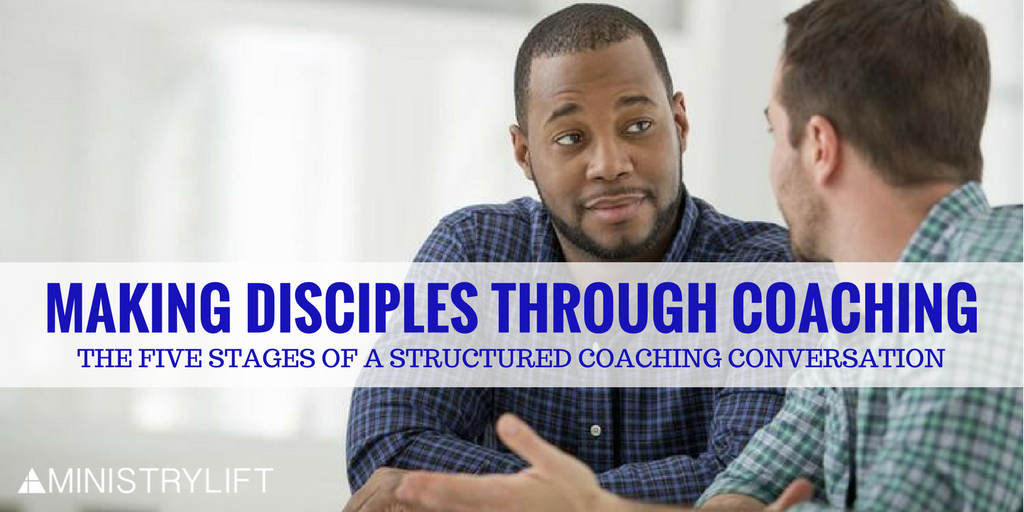The 5 Stages of a Structured Coaching Conversation
 Coaching and mentoring are a way of life. We can turn any conversation into a mentoring opportunity by listening, asking good questions, helping people focus on what’s most important, and empowering them to take next steps (I address these four skills in my blog, Why Being a Mentor Isn’t as Scary as You Think). However, there is also a place for using these skills in structured coaching sessions where we intentionally engage in disciple-making conversations during several planned sessions.
Coaching and mentoring are a way of life. We can turn any conversation into a mentoring opportunity by listening, asking good questions, helping people focus on what’s most important, and empowering them to take next steps (I address these four skills in my blog, Why Being a Mentor Isn’t as Scary as You Think). However, there is also a place for using these skills in structured coaching sessions where we intentionally engage in disciple-making conversations during several planned sessions.
In this blog, I will describe the five stages of a structured coaching conversation using the COACH Model for Christian Leaders by Keith Webb (you will notice that each stage corresponds to the letters in the word COACH).
Connect – build rapport and trust
Every mentoring conversation requires a meaningful connection, so that the other person is willing to share and explore possibilities. At the start of the session, it’s important to take time to build rapport, revisit goals from the previous session, and pray together.
Sample questions:
- How have you been?
- What progress have you made on the action steps you identified the last time we spoke?
Outcome – find out what the person would like to discuss
In a coaching session, it is highly beneficial for the coachee to identify an outcome for the conversation. This helps focus the interaction on what’s most important to them, leading to better results. Asking good questions can probe beneath the surface of a presenting issue and uncover something that might be even more critical to discuss. Make sure that the outcome is achievable during the time you have together.
Sample questions:
- What would be most helpful for us to work on today?
- What result would you like to take away from our conversation?
Awareness – discover more about the issues and current reality
One of the biggest benefits of coaching is that when the coach asks good questions, it can expand awareness around key issues that the coachee may need to address. We want to ask good, open-ended questions that do not lead the person in the direction we think they should go. People are much more likely to own and act on something if they discover it for themselves.
Sample questions:
- What are the keys points in understanding this situation?
- What other factors are influencing this situation?
Course – determine next steps
Many coaching conversations fail to challenge the coachee to take action. The COACH Model gently pushes coachees to identify and follow through on 2-3 action steps that will help them address their key issues. The action steps should be SMART (specific, measurable, achievable, realistic, and time-bound), so that coachees have a specific target and can sense whether they’re making progress (refer to my blog called Three Steps for Developing a Personal Goal Plan to learn how to create action steps that are SMART).
Sample questions:
- What options do you have?
- Which of these options would you like to follow through on?
Highlights – share lessons and goals
At the end of a coaching session, it’s important to capture the key points and action steps emerging from the conversation. Don’t summarize for them, but let them tell you their main takeaways. In fact, your key points may be different than theirs and we want them to run with the ideas they already own. Take time to pray for them and their action steps.
Sample questions:
- What would you like to remember from this time?
- What parts of our discussion were particularly helpful?
- What do you realize now that you weren’t aware of before?
During my years as a pastor, church planter, and missionary, I thoroughly enjoyed coming alongside people to help them take next steps in their discipleship journey. Looking back, I wish I had learned the COACH Model earlier. It has made a huge difference in my mentoring effectiveness with my family, friends, people in my church, and students.
Randy Wollf is a certified COACH trainer with Creative Results Management. Please contact MinistryLift if you would like to discuss having Randy or another COACH trainer come to your church or organization to provide the highly interactive, hands-on COACH training (offered in one, two, or three-day formats). Randy is the Director of MinistryLift and Associate Professor of Practical Theology and Leadership Studies at MB Seminary.
